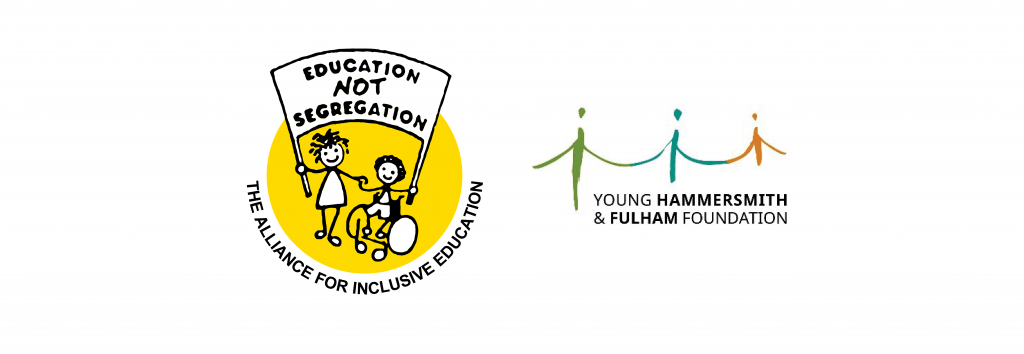Inclusion Champions Project: Lunchtime Conversations
Reporting back on the first Alliance for Inclusive Education and Young Hammersmith & Fulham Foundation joint Lunchtime Conversation with members.
 On the 25th June Alliance for Inclusive Education and Young Hammersmith & Fulham Foundation held our first joint Lunchtime Conversation with 6 members from Young Hammersmith & Fulham Foundation. The session was facilitated by Michelle Daley, Justine Jones & Annie Rockson.
On the 25th June Alliance for Inclusive Education and Young Hammersmith & Fulham Foundation held our first joint Lunchtime Conversation with 6 members from Young Hammersmith & Fulham Foundation. The session was facilitated by Michelle Daley, Justine Jones & Annie Rockson.
The conversation took placed via Zoom and centred around the following questions:
- What are your concerns around inclusion?
- Do you know Disabled People’s Organisations and how do you work with them?
- How are you involving Disabled Young people in your projects?
The purpose of the meeting was to provide a space to facilitate a conversation on a capacity building process, that encourages co-production, participation and the inclusion of Disabled people’s voices. ALLFIE knows that through effective capacity building organisations can develop sustainable and long-lasting positive inclusion of all Disabled people.
Conversation responses
The scene for the conversation was set when one of the attendees commented that services are often “targeted rather than create inclusion” which got people thinking about these two narratives.
What are your concerns around inclusion?
There were four themes that came out of this topic these were:
- Cost: this is because access costs are not factored as part of budgets which means projects will not be able to meet costs such as BSL interpreters etc
- Access/buildings: lack of information available about accessible spaces within the borough
- Network/spaces: no forum to discuss and share learning within the borough
- Reaching Disabled Young people: difficulties reaching Disabled Young people, lack of support to enable participation of Disabled Young people
Do you know Disabled People’s Organisations (DPO’s) and how do you work with them?
The knowledge and understanding about who DPO’s are and their role in driving Disabled people’s inclusion and rights was very limited. Those organisation that did have involvement with the local DPO found them to be useful in helping to deliver projects and reaching Disabled children and Young people.
How are you involving Disabled Young people in your projects?
“How do we catch Disabled Young People voices, creative ways to do that”
All the responses shared were at a participant’s level where Disabled people are recipients of a service. Therefore, it was difficult to know how Disabled people’s voices are being valued in decision-making, service delivery and leadership roles of projects. Some of the examples of Disabled Young people’s involvement:
“Work with Disabled People’s Organisations to provide members to attend an engagement meeting to shape projects under football theme.”
“Involving Disabled Young People in the planning process.”
Moving forward
Here’s what people said:
“Having a focus partnership group will help going forward. Support each other with funding, examples of good practice and partnership working”
“Training for staff to make sure they are equipped to support Disabled Young People”
“Need for shared learning and examples of good practice.”
“professional input and shared experiences on a platform like this is useful”
“Examples of good practices from out of the borough. Bring in DYP voices”
“Useful to continue and build on this shared conversation. Sharing services and joining the dots”
“In contact with AoD (Action on Disability) but hope to work with them in the future”
Please look out for the next lunchtime meeting which will take place bi- monthly
Justine Jones, Inclusion Champions Development Worker
![Allfie [logo]](https://www.allfie.org.uk/wp-content/themes/allfie-base-theme/assets/img/allfie-logo-original.svg)




Discussion
There are no comments so far.